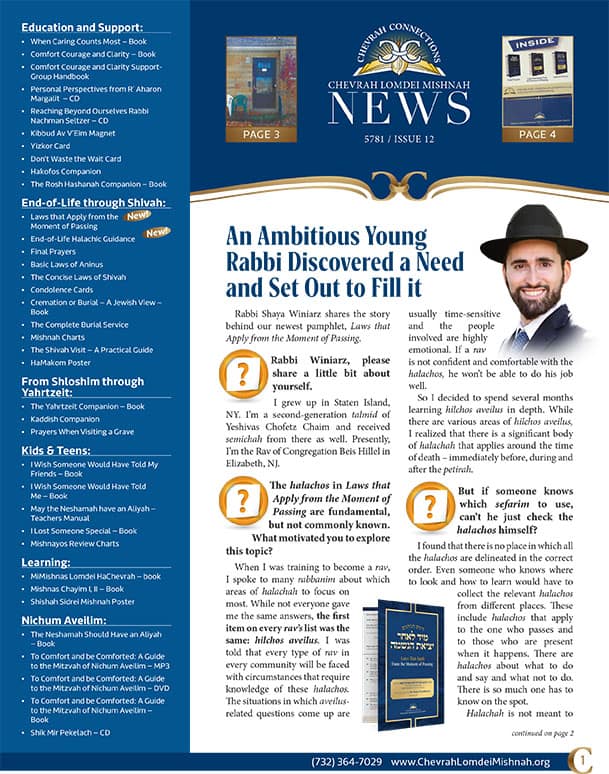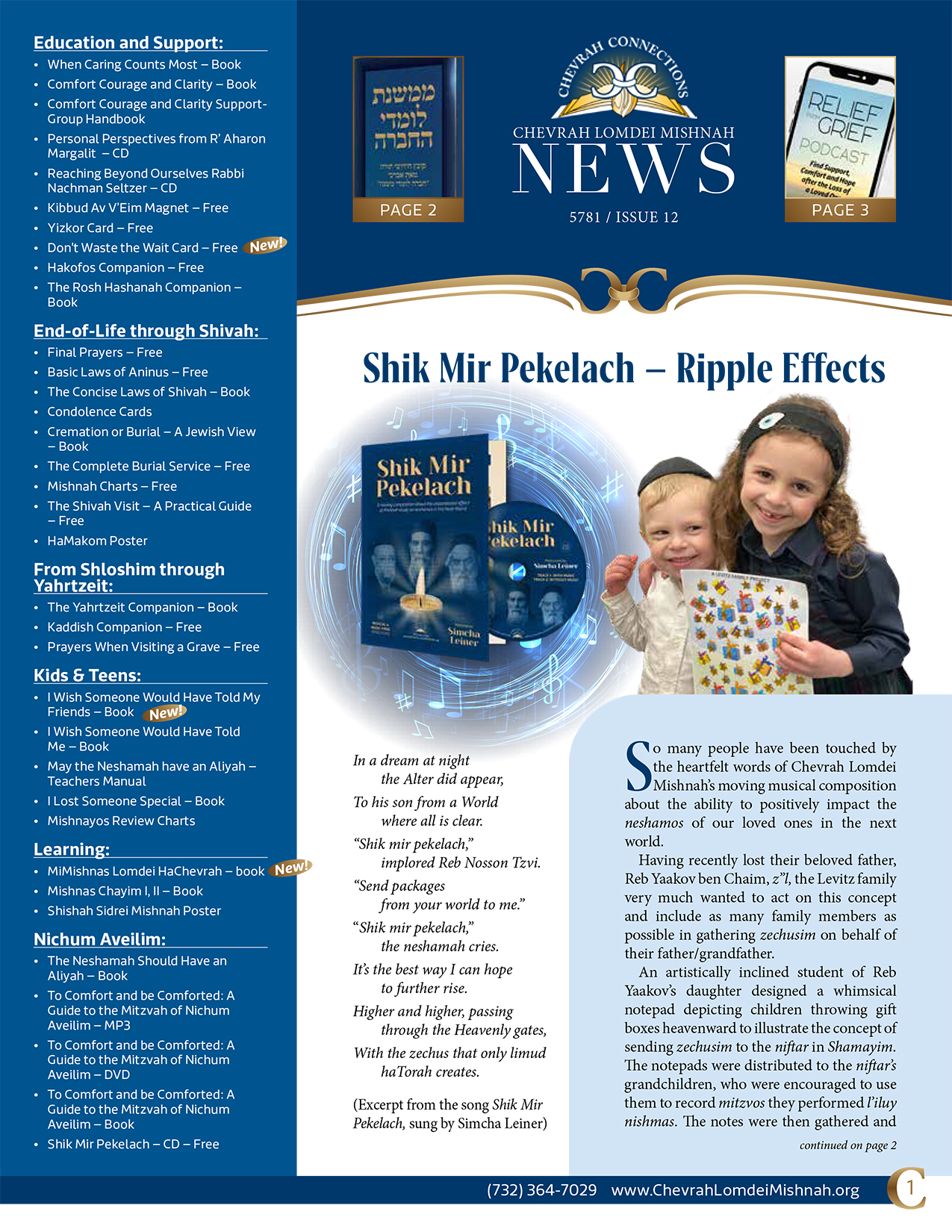Yated
The novi Yeshayah tells us in this week’s haftorah that we must feel comfort following all of the destruction we felt on Tishah B’av. Nachamu, nachamu, ami.
Rav Avrohom Kluger in his Sefer Nezer Yisroel tells the story of a rov who went to pay a shivah call to a family who just lost a child in a terrible auto accident. Besides the grieving parents, there were many older siblings sitting shivah at the home, and all week they had been discussing what they would accept upon themselves to improve in their avodas Hashem as a result of this tragedy. They asked the rov what he thought they should be mekabel.
“You want to know what you should be mekabel during this time? I’ll tell you exactly what Hakadosh Boruch Hu wants you to be mekabel, and no, I’m not a novi,” the rov said. “But I know 100% that Hashem wants you to be mekabel tanchmin! Don’t think that it is so easy to simply move on after a tragedy. Taking comfort and consolation, being mekabel tanchumin, is a great avodah Before you take on and be mekabel anything else, make sure that you work on being mekabel tanchumin. Work hard at being consoled!”
A very helpful aid in being comforted from tragedy is a book release a few months ago titled “To Comfort and Be Comforted.” Published by Chevrah Lomdei Mishnah, an organization dedicated to Mishnah study for departed neshamos, the book contains the transcribed speeches and thoughts of close to 40 Torah personalities. Rabbi Moshe H., president of Chevrah Lomdei Mishnah, did a wonderful service in arranging for all of the contributors to share their thoughts on how people should properly fulfill the mitzvah of nichum aveilim and how mourners can ultimately be consoled from tragedy.
I personally dealt with the loss of my father z”l over the past year and began reading a portion of the book every day, finding great comfort in doing so. While a main focus of the book is instructive regarding what to say and what not to say when trying to comfort a mourner in a shivah house, the book contains much in the way of wisdom regarding how a mourner can feel comforted.
A sampling of some of the great wisdom and insight in the book follows.
The book begins with Rav Shmuel Kamenetsky imploring all of us to prepare before we go into a shivah house. We need to think about what we want to say and what we would like share with the mourners. Going to be menachem avel without forethought, but relying on the standard schmoozing, is not a proper way to try to comfort. Chazal tell us that you have to wait until the avel starts to speak before saying anything. Rav Shmuel explains that we need to first know what is on the avel’s mind in order to know what we can try to say and offer some consolation. Rav Shmuel says that it is extremely vital that those comforting the aveilim leave the house and think about what they gained and whether they were effective in offering comfort. It is very important that we walk away with hisorerus, Rav Shmuel says.
Rav Yaakov Bender points out that we should never feel that the reason we are going to a shivah is merely to “show our face.” We go to try and strengthen and be mechazeik the avel. We go to hear about the niftar and learn lessons. Allowing the family to share lessons about the departed brings some comfort to them. If we can relay how the niftar impacted our lives, it is an even better nechamah, as we know how the legacy of the niftar continues.
Rav Noach Orlowek analyzes the word and says that, at its root, the word really means to be cut off, as it says in Megillas Eichah (2:8), “Vaya’aveil cheil vechomah – The walls were cut down.” He explains that the word avel also relates to the word afal, darkness, and since the letters of bais and pey are formed by the lips, and, according to Rav Shamshon Raphael Hirsch zt”l (based on Rashi, Vayikra 19:16), letters formed in the same part of the mouth can often be interchanged, showing how different words share a root meaning., Thus, an avel feels like he is in a dark place, cut off and alone. The function of nichum aveilim is for the person not to feel alone.
It is clear from Rashi (Bereishis 6:6), says Rav Orlowek, that the word nichum, or lenacheim, really means to help a person look at something differently, so that he does not feel so cut off. We must convey that he’s not cut off from others, and he is not even cut off from the person who he is mourning. The neshamah continues to exist, and we have the ability to maintain a connection with the niftar through our actions and learning.
Rav Orlowek related a sad story of a mother whose son was murdered in a terror attack. She was cut off for years and was not really functioning. She felt that she had to continue mourning if she was to be loyal to her son. Rav Orlowek had taught her daughter, and when he eventually met the woman, at some point, he tenderly said to her, “Do you think that your son wants his siblings to lose a mother? He wants you to be there for them and come back to them.” This made the mother think about things differently, making her realize that she could actually connect with her dead son’s wishes by trying to be a good mother again. She was not disloyal and cut off from her child if she was fulfilling his wishes. By being there for her family, she was also being there for her deceased son as well.
Applying this to the churban Beis Hamikdosh, the Ribbono Shel Olam wants us to mourn, but He also wants us to feel comfort knowing that our daily mitzvos and zechuyos keep adding up, so that one day soon the geulah will come.
“To Comfort and Be Comforted” is 400 pages long and contains a vast amount of information to be used for passionate growth in the area of providing and feeling nechamah.
– August 2016













